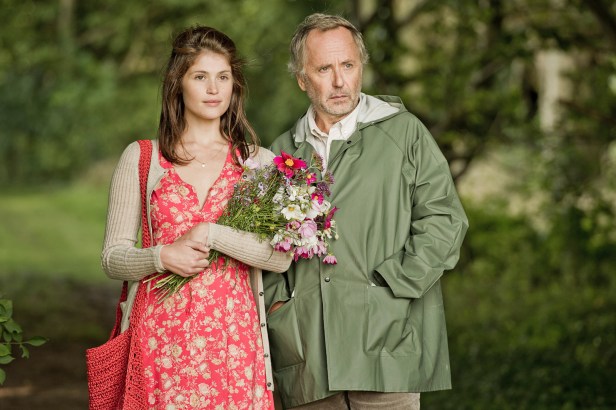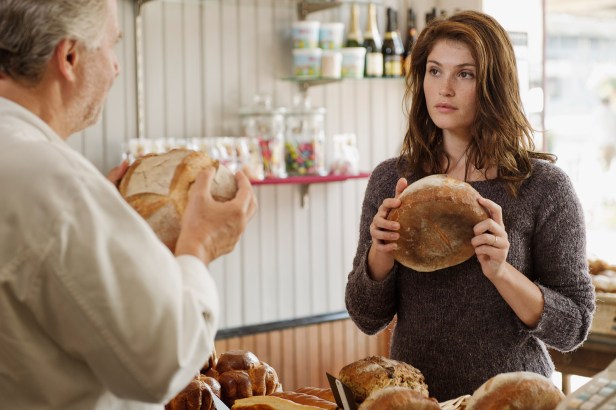Gemma Bovery (2014)
Over 150 years ago, Gustave Flaubert stunned the world with his groundbreaking novel, Madame Bovary, a tale about a small-town doctor’s wife who becomes entangled in a tragic love affair in order to escape her banal, routine existence; the story chronicles a woman trapped by convention and tempted by passion. Since its release, the character of Emma Bovary has become a literary and cinematic archetype of sorts, fueling an entire subgenre of stories about women looking to escape their surroundings only to find heartache and sorrow on the other side. While the spelling and time period might have changed, this updated version of the literary classic, Gemma Bovery, succeeds as a breezy, postmodern retelling of the narrative, one that replaces Flaubert’s ‘darker’ elements with cheeky laughs and delicious eye candy, be it shots of the lush expansive countryside or the delectable Bovery herself.

In this vibrant seriocomic re-imagining of Madame Bovary, life imitates art in more ways than one when down-to-earth British beauty Gemma Bovery— played by the curvaceous Gemma Arterton — and her furniture restorer husband, Charles (Jason Flemyng), move into a pleasant but run-down farmhouse in the very same Norman village where the book was originally written a century earlier. However, their welcoming neighbor, ex-Parisian local baker and Flaubert expert Martin Joubert (Fabrice Luchini) — who lives next door with his nagging wife, Valérie (Isabelle Candelier) and idiotic son, Julien (Kacey Mottet Klein) — immediately becomes infatuated by Gemma’s entrancing good looks, along with the fact that she appears to have the exact same surname as Flaubert’s heroine. Keeping tabs on his new neighbor, Joubert decides to mentor and guide Gemma around town, igniting a friendship that’s brimming with underlying sexual tension … well, on Joubert’s part anyway.
Alas, just when Martin thinks that Gemma might finally be falling for him, she meets Hervé de Bressigny (Niels Schneider), a smug aristocrat who’s temporarily cooped up in his parent’s nearby chateau, and just like the heroine in Flaubert’s book, she embarks on a scorching affair with the arrogant snob. As the nosy Joubert watches Gemma from afar, the Boverys’ marriage begins to crumble with Gemma finding herself caught between her steamy fantasy and the rural reality of French domesticity. Complicating matters further is Gemma’s magnetic ex-boyfriend Patrick (Mel Raido), a food critic who suddenly reappears in pursuit of his ex-lover. With Gemma now at a crossroad of sorts, Joubert’s worst fears are fulfilled as he realizes that her destiny might actually be entwined to that of Flaubert’s doomed Madame Bovary.

Adapted from the 1999 graphic novel by English cartoonist Posy Simmonds — who similarly reimagined Thomas Hardy’s nineteenth century novel, Far From The Madding Crowd, which went on to become the Gemma Arterton starring vehicle, Tamara Drewe (2010) — Gemma Bovery is a fun literary mash-up, a frothy romance and a heady celebration of French provincial life. This enjoyable outing from hit-or-miss director Anne Fontaine — the woman who brought us the sumptuous Coco avant Chanel (2009) — benefits from its picturesque Normandy setting; whether it’s the crisp countryside locations or the so-good-you-can-almost-taste-it patisserie, every frame in the picture has been vigorously brought to life by Christophe Beaucarne’s, Coco avant Chanel (2009) striking cinematography. Let’s not overlook the carefully chosen but subtle winks at Flaubert’s novel in the way of wardrobe choices by costume designer Pascaline Chavanne, Swimming Pool (2003). Furthermore, the filck’s various rustic old world interiors, particularly the Boverys’ house, add an extra layer of authenticity to the feature with production designer Arnaud de Moleron, 8 Women (2002), showcasing an evident eye for detail.
Whilst certainly entertaining, Gemma Bovery only falters when judged by its narrative heft as neither the author, nor screenwriters, Fontaine and Pascal Bonitzer, La Belle Noiseuse (1991), seem all too concerned about exploring any sort of thematic depth within their account; even the script itself deviates from Simmonds’ original material and favors Joubert over Gemma as she is predominantly seen through his point of view — as a voyeuristic object — and never quite develops into a full-bodied personality. With somewhat ‘hollow’ characters, it’s rather difficult to invest oneself in Gemma’s plight. Moreover, Gemma’s ‘problems’ aren’t overly relatable in 2014 either; she’s not exactly trapped in her marriage — she can essentially leave at any given moment — she’s also seemingly free to do whatever she pleases and appears to have very little in the way of real responsibility. In addition, Gemma’s apparent boredom and dissatisfaction don’t necessarily justify her murky actions.

Although presented as a light drama, the film’s unconventional third act is also quite dark — albeit adhering to the novel’s sombre conclusion — and feels slightly out of place. During this surprising last act turn, the picture unfairly blames the men in Gemma’s life for her adulterous actions and eventual fate with results failing to convince or truly satisfy — Gemma is painted as a victim of the men who ultimately failed her. Thankfully, the flick’s final scene hints at the notion that the filmmakers are aware of its frolicky nature and aren’t treating the picture as if it were anything other than a ‘naughty’ comedy.
Fabrice Luchini, In the House (2012) — who narrates the picture while reading Gemma’s diaries — steals the show as the former publisher now smittin’ baker, Martin Joubert. Delivering his fabulous one-liners in French, English and often hilarious Franglais, the deadpan Luchini generates the film’s biggest laughs, hamming it up as the meta-lit observer who possibly knows a bit too much. Ex-Bond babe Gemma Arterton, Quantum of Solace (2008), radiates with sass and sex appeal as the titular housewife who’s bored with her life and plays well off Luchini’s flirtatious pastiche. Arterton’s natural sultriness and her character’s ability to mesmerize men are never in doubt as the luminous actress fully embodies the physical requirements of her role. Make no mistake, director Fontaine certainly knows how to shoot the shapely Arterton, with a specific sequence — where Gemma gets ‘hot and heavy’ whilst kneading dough — acting as a paean to Arteton’s unparalleled allure. Finally, it’s Jason Flemyng, Lock, Stock and Two Smoking Barrels (1998), who stands out amongst Gemma’s suitors as her hard working, faithful husband, Charlie.

Attempting to revive the character of Madame Bovary for the modern generation, director Fontaine’s Gemma Bovery is an enjoyable romp that balances its sensuality and witty feminist commentary with hilarious one-liners and comic set pieces, yet unlike its source material, this rebirth fails to resonate on any emotional level. Wonderfully shot, aptly acted and perfectly realized, Gemma Bovery is an amusing little ditty about the dangers of stirring passions. Oh, what I’d give to be bored and beautiful!
3 / 5 – Good
Reviewed by Mr. Movie
Gemma Bovery is released through Regency Film Distribution Australia